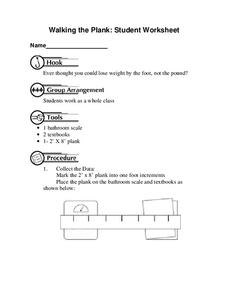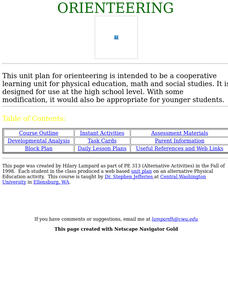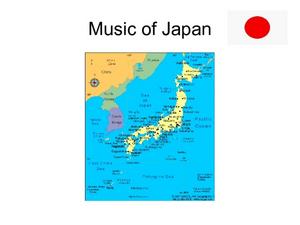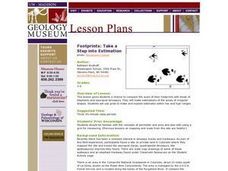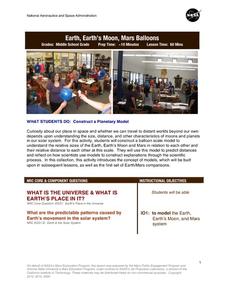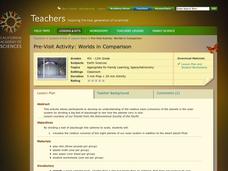California Academy of Science
How Big is Big?
In a math or life science class, "mini-me" models are created with cardstock to reflect a 1:10 scale of students' bodies. Learners measure each others' heights with meter sticks, and then reduce the size by 10. After this exercise, they...
Curated OER
Lesson: Before You Go...Travel Recommendations from the Experts!
Here is a lesson that sounds like a lot of fun. Kids discuss the artistic elements and motives for the painting, Grand Canyon of the Yellowstone. To get the scope and scale of this oversized masterpiece, they use butcher paper and the...
Curated OER
Walking the Plank
This is a cool math activity. Kids collect and interpret data based on a physical act. A board is balanced between a scale and a step, learners record a peer's weight as it decreases while s/he walks further away from the scale. They...
Curated OER
Orienteering
Everything you wanted to know about orienteering, and more! Take your class on an adventure with this creative activity. You will need to gather some supplies and materials and maps for your specific location, but the unit sounds like it...
National Gallery of Canada
Build a City of the Future!
Tap into your pupils' imagination by asking them to design futuristic, ideal cities. They must discuss and take scale and size into account, looking at some model pieces of art for inspiration and analysis. The final product for each...
Curated OER
Stadiums in America
Let's play ball! A great springtime activity to learn about ratios. This activity challenges learners to draw stadiums to scale on standard letter paper and also on construction paper. This three-day instructional activity includes a...
Curated OER
Lesson #2 ~ Nanoscience and Nanotechnology
You might love this lesson, or you might not. Basically, high school scientists read through a script in which someone interviews a physicist, a biologist, and a chemist in regard to their use of nanotechnology. The names of the involved...
Curated OER
Housing Project
Find everything you need for a two-week home construction simulation project for your high school economics class. They come up with the plans for a custom home including the cost per square foot, interest rate, mortgage term, down...
Curated OER
Probability Scale 0 to 1
Use a probability scale line to help introduce learners to odds and probability. They start by examining an example line, looking at where events would fall from 100% probability to 0%. Next, learners complete two of these on their own,...
Curated OER
Music of Japan
My, how Japan has changed! From Hogaku to karaoke, this slide show provides an overview of the culture, instruments, and periods of transition through Japanese music. Here you will find 21 text-rich slides which are great for note taking.
Curated OER
Our Solar System - Comparing Planetary Travel Distances
NASA presents a mini-unit on distances in our solar system. It incorporates scientific concepts of gravity, mass, density, and payload while your aspiring astronauts also employ mathematics skills. They calculate speed, they determine...
Curated OER
Environmental Agents of Mathematics: Mathematics for Change
High schoolers analyze environmental science data using Math. They do research about renewable energy, gather data, create graphs and interpret their findings. Then the group presents their arguments persuasively using their findings to...
Math Can Take You Places
Picture This
Engage scholars in a ratio lesson that employs real-world scenarios. Learners will compare the length and width of pictures and use a table to identify ratio patterns. They watch "Math Can Take You Places" and discuss jobs that use math...
Curated OER
Draw an Inch, Walk a Mile
Students work in small groups to solve the problems presented. The main project, mapping the classroom, use these discussions to collaborate in creating a tangible demonstration of their understanding.
Curated OER
Scale Model of the Solar System
Young scientists gain a better understanding of space, the solar system and its vastness by creating a scale model. Students first need to calculate the distance between each of the nine planets according to the size of their scale. This...
Curated OER
Footprints: Take a Step into Estimation
Compare sizes of student footprints with those of elephants and sauropod dinosaurs! Upper graders make estimations of the areas of irregular shapes; students use grids to make and explain estimates within low and high ranges.
Curated OER
Mapping It Out: Social Studies Online
A great way to introduce 2nd graders to map skills would be to use this presentation. The visuals are inviting and the layout is easy to understand. This would be a terrific way to cover the basics on how to read a map. There is also a...
NASA
Solar System Scale & Size
Use a variety of whole fruits to represent the different planets in the solar system to introduce scale sizes to your math or space science class. They follow suit by creating a non-scaled model of the solar system using specific-colored...
NASA
Earth, Earth’s Moon, Mars Balloons
Very specific diameters are given for blowing up three different balloons to represent, in scale, the moon, Earth, and Mars. In groups of three, amateur astronomers explore scale measurements and distance in space.
Pacific Science Center
Worlds in Comparison
Young astronomers follow a step-by-step procedure for dividing a lump of dough into parts, resulting in a scaled volume set of puny planets. Along with the printable directions is a template chart of planet names on which learners can...
Illustrative Mathematics
Floor Plan
A multi-step problem has learners finding the actual area based on a scale drawing and then converting units at the end. Two different solution choices are listed depending on the preference on which step to start first. Both methods can...
Curated OER
Essential Elements of Habitat
First graders compare their local area with the Belize landscape. They construct maps of the school area, adding descriptive information. They write haiku poems about their favorite outside places.
Curated OER
A Pentatonic Scale Activity
The famous Japanese tune, "Cherry Blooms" was composed using a pentatonic scale. Budding musicians explore the nature and theory behind the pentatonic scale as well as the East Asian music it is commonly used in. Multiple extensions are...
Curated OER
Music Knowledge: pre/post test
While this is not a lesson, it could potentially take as long as one. This is a 73-question test to administer to those studying music. They'll need to answer questions regarding general music terminology, theory, and composition.




